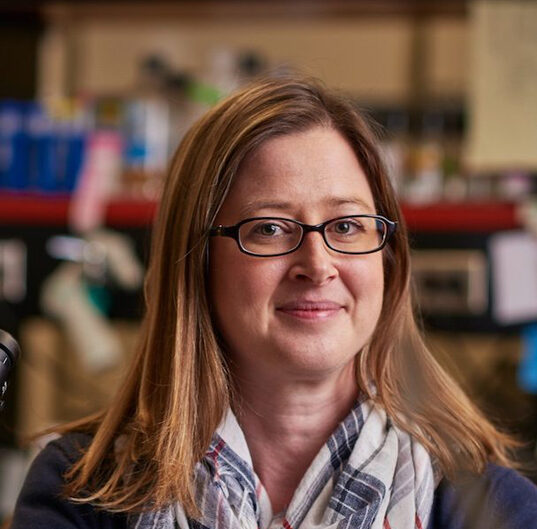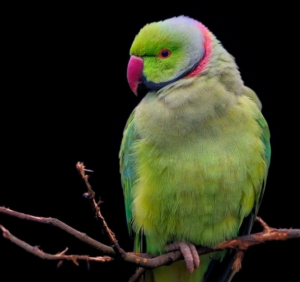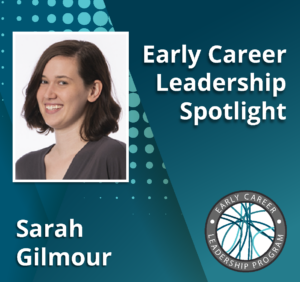Sonia Hall is working with the GSA in a newly-created role as Program Director for Early Career Scientist Engagement. Executive Director Tracey DePellegrin spoke with Sonia about why focusing on helping this group of scientists is so important, including plans to start a GSA steering committee led by graduate students & postdocs.
Sonia received her PhD in Molecular, Cellular, and Developmental Biology in 2015 from the University of Kansas. As a graduate student, she became a Trainee Advisory Member of the GSA Education Committee, and later became a Trainee Advisory Representative for the GSA Board of Directors (2014-2016). As a graduate student and postdoc, Sonia has been engaged in the national conversation about workforce issues surrounding PhD trained scientists. She led or assisted in the development and implementation of numerous professional development events and programs for early career researchers, including events at The Allied Genetics Conference. Sonia is completing a one-year fellowship in the Center for Biomedical Career Development at the University of Massachusetts Medical School. She is also building career and professional development curricula and assisting in data analysis for the NIH BEST-funded programs at UMass Med.
Tracey DePellegrin: I’m delighted to work with you again! You’ve contributed so much to GSA and to our members. But let’s turn the tables: what are some of the ways GSA has influenced your scientific career?
Sonia Hall: Oh my goodness – where do I even begin? My participation in GSA activities has been my source of professional skills development. From written and oral communication, leadership, project management, program development and more, I’ve learned it from GSA under the mentorship of GSA staff and membership.
One important experience was Beth Ruedi asking me to assist in organizing the very first trainee bootcamp for GSA. She gave me complete creative control over half of the event and empowered me to see my vision through. I reached out to individuals whose work I had admired from afar, like Ethan Perlstein, Lynn Cooley, and Jason Tennessen! The opportunity also taught me quite a bit about the logistics involved in planning scientific conferences.
TD: The majority of our members are early career scientists, many of whom are facing uncertain funding, competitive environments, and long hours, among other things. How can the GSA best serve this group?
SH: It’s important to integrate professional development opportunities with society activities. This allows members to have access to quality and career-enhancing experiences but with minimal impact to research productivity. I want early career scientists to leave any experience with GSA feeling that their time away from the research setting was worth the investment.
I also want early career scientist members to have an active voice within the society and in the larger scientific community. They are the future of our community and their voices should be represented within the society.
Here at the GSA, I’m building an early career scientist steering committee that will be led by graduate student and postdoc members. The committee will focus on three main areas of interest: building relationships with professionals and companies in the larger scientific community, engaging in early career advocacy efforts, and communicating the impact of fundamental discoveries that originated in the model organism community.
TD: You’ve said that your first experience at a GSA meeting was transformative. Can you speak to that?
SH: Being an undergraduate student, I didn’t understand what the scientific community really was. I had an exceptional undergraduate research mentor, GSA member Robert Ward at the University of Kansas, who provided the opportunity for me to attend the 2011 Annual Drosophila Research Conference. I had never presented my work to other fly people, and I just remember thinking that I was way out of my league.
But there I was with Rob, who later became my graduate advisor, hanging our poster in this giant exhibit hall. People asked me about my work and were genuinely interested in my contribution to our project. Rob was wonderful about introducing me to his former colleagues, friends, and other scientists working in our field.
Science became more than a field of study during that meeting; it became a collection of passionate, creative, and talented people working together. I felt, and still feel, so fortunate to get to contribute to this amazing community.
TD: What is your sense of the biggest challenges faced by today’s graduate students and postdocs in genetics (and related fields)?
SH: I’d say the state of the workforce. Having PhDs working outside of academia isn’t new, but the growing number of PhDs entering other sectors brings challenges. This increasing diversity in career outcomes is concerning because graduate and postdoctoral training programs focus on academic careers; this leaves the majority underprepared for their transition into a non-academic career. We need to modernize graduate education nationally. Many approaches are being tested and evaluated across the country, including here at UMass Med. I’m fortunate to work closely with innovative thinkers like Morgan Thompson, Cynthia Fuhrmann, and Mary Ellen Lane on addressing this critical need.
This modernization of graduate education is viewed as a challenge for a variety of reasons. Our academic system has successfully demonstrated their ability to produce highly specialized scientists. We train graduate students and postdocs, who make tremendous contributions to the scientific enterprise in the form of data collection and analysis. The work conducted through the training partnerships of faculty mentors and their students and postdocs is a major driver of scientific progress in our country.
That said, ideally, solutions to help the younger workforce shouldn’t have a negative impact on scientific output. Additionally, many of us are trained using funds from federal grants. The question does arise as to whether these funds are achieving the desired return on their investment when a trainee decides not to continue a research career.
To me the challenge is not so much about retaining each individual in a research position — because not everyone desires a position in intensive scientific research — but rather demonstrating that there is a very real economic benefit to having trained scientists working in a variety of sectors.
TD: What’s your advice for young scientists facing those problems?
SH: They should reach out for career development. There are many opportunities to develop professional skills that are beneficial both within and outside of the research setting. Take action to develop a diverse set of skills early in your training, and don’t wait until it is time to make a transition. If opportunities don’t exist around you, create them yourself!
I often reflect back on the example that my mother set for me when I was growing up. If she saw a problem or need or was dissatisfied with something, she did something to change it. She sacrificed so much of herself to improve the lives of others – I guess that has left a fundamental mark on me as an individual and professional.
TAD: I’ve always been impressed by your thoughtfulness, energy, and commitment to the projects in which you engage. What’s your inspiration?
SH: I’m just one person with an interest and passion. But, if I create an opportunity for others to join us, we can have a greater impact on our community. That really inspires me to create collaborative projects.
I believe deeply in giving back to the communities that have shaped who I am. The scientific community has played a big part in that for me. I was really inspired by my graduate mentor to advocate for the advancement of the genetics community. He demonstrated for me the commitment to deepen our understanding of the biological world, our responsibility to mentor others, and the importance of the each person’s work, regardless of the prestige of their grant funding, elite institution, training pedigree, etc.
We were a small lab without a large research grant. But, that never stopped Rob from having a major impact on those that he taught or mentored. He also never hesitated to provide precious antibodies, other reagents, or scientific insight to the Drosophila community. I trained under this incredible individual and in some way; I see the programs I develop as furthering his investment.













